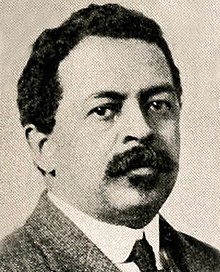Trotter graduated as valedictorian and class president from the all-white Hyde Park High school. He moved on to Harvard University, where he was awarded merit scholarships and became the first man of color to be awarded with a Phi Beta Kappa key at Harvard. While at Harvard, he lead the Total Abstinence League, which was a temperance organization, along with becoming active in the Baptist Church.
Trotter had very strong views on racial equality, which were seen in a paper in 1899 where he called on African Americans to continue pursuing higher educations. At the same time, another very prominent figure in the African American community, Booker T. Washington, was presenting many different ideas. Washington believed that African Americans in the South should not try to obtain political rights but rather be provided with economic opportunities and basic rights. He believed that if they proved their own worth they would eventually be given all rights. However, Trotter had opposing views, believing that it was necessary to fight for equal treatment because it would eventually lead to more benefits.
In 1901, Trotter's founded the Boston Literary and Historical Association and joined the Massachusetts Racial Protective Association, two very racial activist groups. Trotter began giving protest speeches, in which he publicly attacked Washington's stance. Along with George W. Forbes, he founded the Guardian, a weekly newspaper which was a platform for speaking out for racial equality. Publications on the Guardian consistently spoke against Washington and his ideas.
In 1905, Trotter, along with W.E.B. Dubois founded the Niagara Movement, a civil-rights group dedicated to change for African Americans. It demanded things such as an end to segregation and discrimination in unions, courts and public accomodations, along with economic and educational equality. This movement eventually led to the creation of the National Association for the Advancement of Colored People, or NAACP, in 1909, an organization still exists today. The NAACP included both whites and blacks, and its mission is to "secure the political, educational, social, and economic equality of rights of all persons and to eliminate race-based discrimination."
Later on, Trotter mounted other campaigns, including one against the play The Clansman. It portrayed the Ku Klux Klan in a very positive and heroic light, but due to the protests, it was eventually closed in production. Similarly, he also protested The Birth of a Nation, a film adapted from The Clansman.
After the death of his wife in 1918, he became much less active, but still wrote for The Guardian. He eventually died in 1934, at the age of 62.

Sources:
https://www.history.com/topics/black-history/niagara-movement
https://en.wikipedia.org/wiki/William_Monroe_Trotter
https://www.history.com/topics/civil-rights-movement/naacp
https://www.naacp.org/about-us/
This is a very interesting article about William Monroe Trotter - it highlights a man that cofounded the Niagara Movement, which was ultimately the reason that the NAACP was founded. It is also impressive that this time period was the birth of black leaders, whose impact lasts until this day.
ReplyDeletehttps://www.naacp.org/about-us/
This is a great blog past about a not as well known activist in comparison to W.E.B. Dubois. It's interesting to see that he worked directly with Dubois to form the Niagara Movement and NAACP which still exists today. It goes to show while there were those like Booker T. Washington who said accept your condition there were others who believed in a better future for African Americans.
ReplyDeleteI find it interesting that, despite his many contributions towards the advancement of racial equality, Trotter didn't seem to cooperate all that well with other leaders of his time. While he was a member of the NAACP, Trotter was often at odds with W.E.B. Dubois and the decisions of the organization. When Trotter eventually left the NAACP in opposition to women joining and his belief that the organization was compromised by white leadership, he went on to revive the National Equal Rights League. However, due to his exclusion of white members, the League didn't gain much support and was easily overshadowed by the NAACP, a result that Trotter perhaps deserved.
ReplyDeletehttps://www.blackpast.org/african-american-history/trotter-william-monroe-1872-1934/
I really liked this blog post because in our reading we mostly only talked about W.E.B. Dubois and Booker T. Washington, not about other activists. I think it is really interesting how Trotter, Dubois, and Washington all had the same core ideals but had drastically different views of how to reach them. Regardless, Trotter's contribution to establishing the NAACP speaks to his lasting legacy in the fight for civil rights and true racial equality in American society.
ReplyDeletehttps://www.naacp.org/nations-premier-civil-rights-organization/